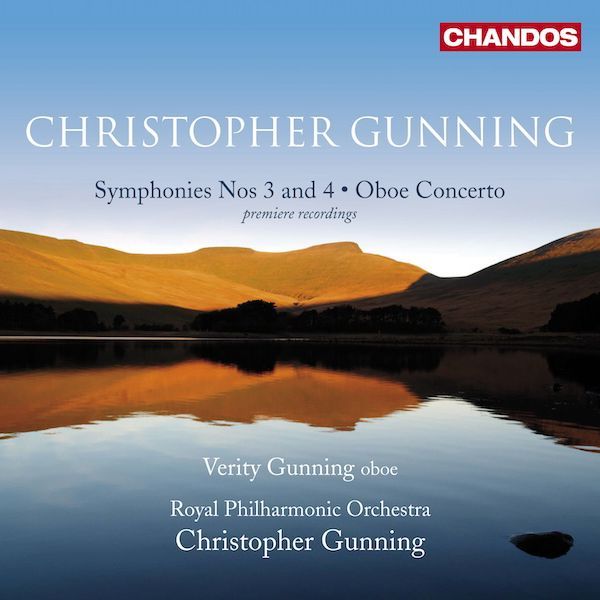Symphonies Nos. 3 and 4

Label: Chandos Records
Catalogue No: CHAN 10525
Release Date: May-2009
Total Duration: 66:53
UPN: 0095115152522
Royal Philharmonic Orchestra conducted by Christopher Gunning
I know some of Gunning's work from his Saxophone Concerto on ASV (White Line CD WHL2138 (2002)) and also from several of his film scores. Chris Fifield reviewed an Albany disc of his First Symphony a couple of years ago. I also recall reviews of his symphonic work for brass band:
Yorkshire Glory. I was pleased and intrigued to see this CD of his seriously intended orchestral music.
He was born in Cheltenham and has been a pupil of Rubbra, Richard Rodney Bennett, James Gibb - whose piano recordings have been reissued on Lyrita recently - and Brian Trowell. In addition to the works here he has a string quartet and concertos for clarinet and for piano to his name. His writing for the screen includes a score for Firelight. There's more to see at his
website. His concert music is predominantly tonal but with the freedom to adopt dissonance to suit mood and trajectory.
While the two symphonies here have a single movement apiece each is helpfully tracked into five segments. The Third emanates from a tortured time in the composer's life. This shows in the occlusion of expression: the shadows, hesitation, even desolation that characterises much of the music. There is a moment of transitory triumph at 4:27 in the first track but the downward tug into fear is dominant. It is typical of this composer that his writing is diaphanous and this work is no exception. In the first section the writing for strings melds with the resonance of bells. This active filigree is also in play in the final pages which offer impudence but little optimism and yet more disillusion. If this symphony carries a doom-laden burden then the Fourth Symphony, written after recovery from serious illness by Gunning and his wife, is more triumphant. Adversity conquered seems to be the message. A glorious fanfaring dialogue surmounts the first section at 4:12 and in doing so reminds us of Copland and Alwyn. It returns in echoing triumph in the final episode.
The Oboe Concerto is here played most skilfully and with great sensitivity by the composer's daughter. This is her first entry as soloist into the world of recording. The Concerto is intended to reflect Verity's character: "thoughtful and sometimes quirky". It's certainly contemplative, pensive and interspersed with flurries of quirky activity. Its perkily active final movement reminded me of the dancing finale of Malcolm Arnold's Oboe Concerto. The composer speaks of a middle eastern tinge to the music but I must say it did not register with me.
The other two symphonies should follow from Chandos in the fullness of time - but how long? Soon I hope.
These substantial works will repay closer attention. For all that they are principally tonal their rewards are yielded up only after repeat listening. Instantly gripping melodic ideas are not on offer here though the writing does beckon the listener in.
Originally published @ MusicWeb International © 1998 / Text reproduced by kind permission



